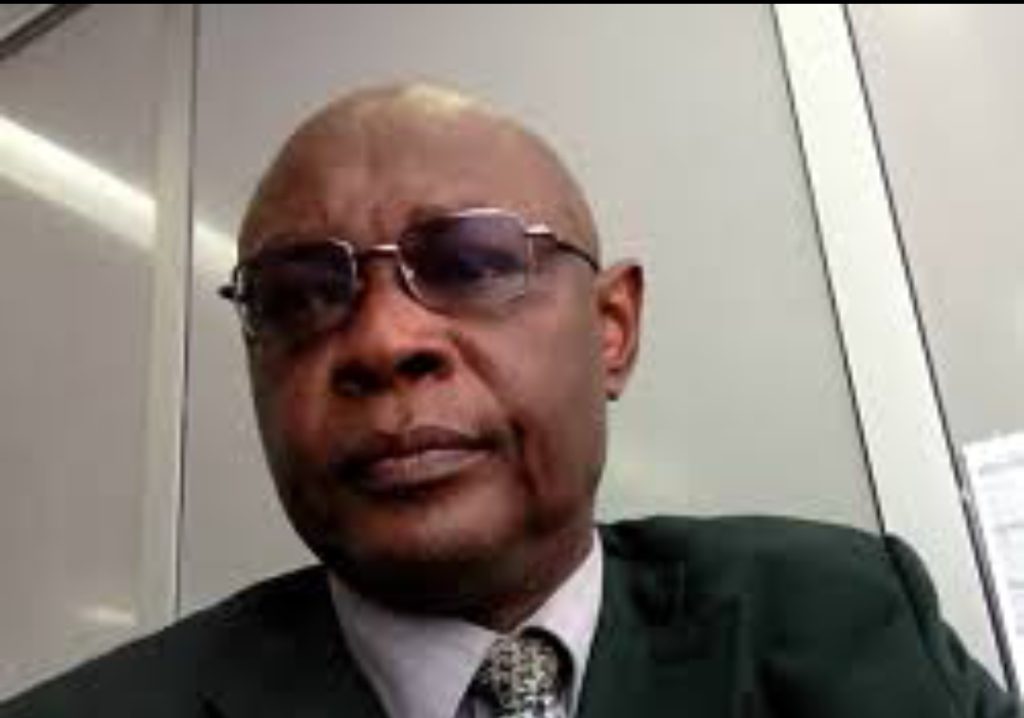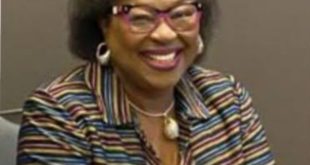
Prof. Ndubusi Ifeanyi Nwokoma is a professor of economics and the director of the Centre for Economic Policy Analysis and Research at the University of Lagos, Akoka, Lagos. In this interview with Arise TV monitored by MMS Plus, he speaks on the 2024 budget of 26 trillion and it’s prospect for the economy as well as the macroeconomic conundrum. Excerpts.
We now have the medium term expenditure framework and fiscal strategy, the government said they are going to retain the January to December cycle and keep to it, now they are proposing a budget of 26 trillion Naira, they are securitizing ways and means, reducing it to about 9%, they are going to borrow $1.5 billion dollar from the world bank and an additional $80 million AFDB loan, which they say is for Ekiti knowledge zone. We are borrowing and spending more on debt servicing, that’s the effect of securitization of ways and means that they are proposing, what can you say on this?

I think what we can do now is just to comment on the decision taken by the federal executive council meeting that was held on various issues.
First and foremost, the budget size of 26 trillion Naira, in my view I think it’s appropriate in the sense that government now has more money, when people are crying that there’s no money but the money has been transferred from private hands to government hand because when government was paying for fuel subsidy before, the people were enjoying some benefits, now the money has been transferred, so government is richer, they have more money to invest in the economy so the size of the budget can be understandable not only for the issue of the subsidy but also in terms of the exchange rate because the bench mark rate now is N700 which was about N461 for this year’s budget, so you can see that the government has more money to spend by increasing the size of the budget from 21 to 26 trillion Naira, I think that’s quite understandable, that’s the first point.

The second point is that, I have looked at all the projections made for the budget. You know a budget is as good as its projections. The document is just a plan, the proposal on what to drive the plan is yet to be taken to the National Assembly. Taking a look at these proposal, government is planning to have debt service increased to 8.25 trillion which in my view it tells you the direction of government, they want to really pay off the debt but they are borrowing more, they are spending much money on debt servicing which tells you that government are trying to get out off the trap which they have found themselves also as we said earlier the ways and means trap.
The other issue we should look at is the benchmark price for crude, $73.96, in my view that’s reasonable. The global market may actually give you more than that, given what is happening in Gaza and Isreal, Ukraine and Russia, so you can see that the global market is actually unstable, so the price of oil might actually go more than $73 so in my view it appears realistic. The 700 Naira to dollar exchange rate is neither here nor there because the market has not been stable, unless government is able to work on supply, that rate may actually be like a dream. So if you take a look at all the projections, inflation 21% when we have that the last report is about 36% so they have to really work things out because if you look at the inflation we have, they are largely cost push and also the exchange rate which they actually have to work on. So that inflation figure, I have my reservations about that but it is not too far from what it ought to be.
The oil production level of 1.78 million barrels per day, oil theft has to be addressed, then the OPEC quarter, those two will drive that, I don’t know to what level we can meet that projection because that will drive the level of revenue you are going to have for the period and then finally the GDP growth rate, 3.76 it’s on a high side because we are talking about second quarter of this year, 2.5% a year so the government has to tell us where the growth will come from. Is it agricultural that is still trying to stabilise, or manufacturing that is battling exchange rate, where will the growth come from!
So these are the general comments before we can now go into details on the meeting that was held in Abuja.
The $1.5 billion secured from the World Bank is said to be interest free according to a statement released just after the meeting. I would like you to speak on the significance of that because one of the things we talk about when securing more loans is the repayment and beyond that is the high interest rate and the likes. Secondly they also talk about a supplementary budget to meet some of the expenses that has occurred since this particular government took office. But there have been a sort of criticism around that because in the last few weeks with the expenditure whether it is in response to humanitarian crises or others, you see ministries coming up with one budget or the other and the question has been where is the budgetary provision for that? Is this announcement putting the cat before the horse or is it still within reason in terms of the money that has been earmarked or allocated for different project without a supplementary budget?
The first question about the new loan and the zero interest rate which is basically concessional from the World Bank, in my view, government may be trying to shore up the exchange rate because by the time you pump in money into the system it will also affect supply for foreign exchange. When you bring in about 1.5 billion dollar from the World Bank it helps to shore up your exchange rate but government has made a commitment earlier in the year of not to involve in getting new loans, so I guess there might be a sort of fire on the mountain for the government to be thinking of that, than telling us its zero interest on the facility, so government needs to be cautious and if we are going to talk about getting out of this debt trap because we are in a debt trap currently, we have about 87 trillion Naira debt on the country and now we are talking about 90% debt service to revenue ratio so the country is actually over-leveraged in my view so if taking more loans and telling us there’s zero interest rate on it, it like trying to eat your cake and still have it because they made a commitment.
So in my view, the loan will help us to shore up the exchange rate, that is basically that more money will come in foreign currency and it will help the foreign exchange market depending on how it’s managed until government can now pick up. And it is going to address other microeconomic issues so to that extent I can say there’s some value in that facility, the low interest rate and also exchange rate consequences.
The other issue about the supplementary budget, in my view, it would be premature for the government to be talking about supplementary budget, that tends to say that they can see gaps in the current budget proposal because if there are no possible gaps then there’s no reason to start telling us about supplementary budget which mean you have not factored everything you need to factor in, so telling us ahead of time that we may do a supplementary budget, you tend to indict yourself about not doing a thorough job before making decisions on critical microeconomics issues so maybe by the time the document is ready and they present it to the National Assembly they can fill this gap and then present something that would be more like a closely planned document, that would only accommodate a supplementary budget when something significant happen in the economy and not that before you start you are talking about supplementary budget so that I think in my view is premature for them to talk about that at this stage when they are just talking about decision making on the projections.
You keep saying we have enough money, is that not an illusion when you say we have money in Nigeria. Let me break it down for you. Based on analysis, this budget is 26 trillion Naira, you know how much it is in dollar when you divide it by 1000 that we are exchanging for the dollar, that’s just about 26 billion Naira. Our budget last year was 21 trillion, if we divide it with the rate we had 600, 650 or 700 or there about, it is about 30 billion, the budget last year in terms of real value of money is more than what we have now because we have devalued out currency. Secondly I like to bring in the case of securitization of ways and means that’s not adding to the money, is that not breaking the law because there no law that supports securitization of ways and means and now the government carries that on their book on 9% interest rate and that money goes to the CBN, they keep lapping it up, what kind of economics are we doing? Last year, we had a budget in the high deficit, this year we are having another. Last year we didn’t make up to 6 trillion in revenue, in 2021 we even did better about 6.1 trillion in revenue. The revenue prospect looks bleak as we speak, how are we going to carry on with this humongous budget that we have in Naira terms that has already devalued and lastly as subsidy are being paid again, subsidy has returned because we keep saying they have stopped paying subsidy but subsidies are back and government see it on their fact book. Your take on this.
The first issue about not having money, government have money in Naira terms that’s why I talk about the exchange rate harmonization, so if you look at it in terms of Naira the quantum of Naira available to government because for every dollar you are talking about #700, last year for every dollar you talked about N461 that what I mean we I say we have money but if we now talk about it in dollar terms it’s a different picture, we are discussing Naira in this engagement. So for now every dollar you sell, you get to earn from oil, you have more Naira available to you than before because of the harmonization of the exchange rate, so the rate moves from 461 to 700, 750 or 770 even though government is trying to bring it down to 700 but we have money from that point of view. As the picture stands Nigeria has more Naira and it was purely transfer from household and firms to the public sector basically because of what we were paying before for them in terms of the subsidy and all that, so government has more money and it has help to shore up public finance, that basically is on that issue.
On the ways and means, it really sad the way Nigeria went under the last administration in terms of the ways and means. Government and CBN gave more loans than allowed in the CBN act to the fiscal authorities so that was a breach of the CBN act and what they are trying to do now is like a damage control of the situation, it is no longer 5% as in last year’s revenue, it is now 15% so basically a lot has been done to do a damage control. There may be no legal justification but in my view if government has come to realize that what they did in the past was wrong and wants an escape route, get it securitize and pay at 9% so the steps taken by government in my view may be a bit justify to that extent but if you look at it from a legal perspective you can see some loopholes here and there so that’s my take on that.
On the issue of return of subsidy in the economy you can also observe that there has been an increase in the price of PMS in the past two months which means that government has been transferring the price change to the public and there might be more increase with all the crises in Gaza and Ukraine, priced will go up and the more it goes up the more you bring in subsidy because government will now have to take the difference or transfer it to the public but if we dont want it to stay the way it is, government has to come in, breach the gap and take the subsidy. So we must make up our mind whether we want government to take a bit of the subsidy or not but Tinubu’s administration has said that subsidy is gone, in my view subsidy should actually go totally so that when there’s an increase in price of crude globally it will affect the price of PMS locally and we should be able to accommodate that provided government is able to invest in infrastructure, the economy and we can see a change in the microeconomics fundamentals, then as we are paying more, we can now see that there are some value we can see. In some other countries like in Ethiopia, you go to get fuel at a particular time, the price has changed in their local currency, you are not sure what the price would be as you approach the fuel station and their economy has been functioning well so we need to let the government get out of this issue. Whatever it is, they should maintain the “subsidy is gone” mantra which the president said on his inauguration and make sure the economy runs on an efficient means so to be able to get the proper microfinance indicators the way it ought to be.
One of the things we have seen in this budget proposal is that wage bills are going up, by the time you add wage bill to the cost of debt servicing that’s higher than the projected revenue, where does that leave capital expenditure if they are spending more than half of the projections just to pay salary, the wage bill alone is 3.7 trillion?
In my view, the wage bill should actually go higher than this because if I have my way, government should be able to cut down on the service and increase wage bill because income are very low across the economy and you need to stimulate consumer’s spending which is very important and one area government is not working on and I think I will give them a very poor mark in the cost of governance, we are hearing about them buying brand new jeeps for people in the National Assembly which cost about 130 to 150 million naira each and how much money was spent by the president on his last trip to New York and when you hear this humongous figures you find out that government is not doing enough to cut down the cost of governance. The political office holders, they are living as if nothing is happening, it is the ordinary man that is bearing the brunt, government has to look at those areas, cut down on the incentives to political office holders, then make sure the wage bill goes higher, then cut down on your debt servicing slightly. Many workers are actually living in penury, the level of poverty in this country has increased significantly. The earnings of an average worker can hardly take him home, so there’s need for massive salary increase because low salary creates room for corruption because when people cannot feed well, they begins to look for other means.
The capital expenditure, government need to spend well, my problem with capital spending in Nigeria is the value for money, the efficiency of the expenditure. We have so many abandoned projects, even if we have a small portion of the budget allocated to capital expenditure we should make sure that we get value for the money and that has not been the case. Labour is actually waiting on the government, so if the government doesn’t perform the country will be in some kind of chaos, so they should actually address workers, workers are not well paid in Nigeria. If you benchmark it in dollar terms, for example, a professor in Nigeria earns less than 500 dollar a month, that’s crazy. Cut down on all those incentives of political office holders, put more money on wages and salaries of workers, then find out how you can manage the debt servicing so that you don’t over squeeze people because you want to get out of debt and manage how you take on new liabilities.
In terms of funding this 26 trillion budget, one of the assumptions has been the prospect of the investment especially some of those secured during the first few weeks or months of these administration’s tenure, you know the Indian investment about 14 billion dollars and this included investment in steel sector, petrochemical sector and the likes. The president has traveled a number of time and the hope is, this will materialize to getting concrete, actual investment and FDI. How confident are we in this assumption that his many visits abroad will indeed bring or translate to investment and then revenue as a nation?
I’m also concerned about the source of funding for the budget, it’s very critical and if you take a look at our budget for the past ten years and beyond, the bulk of the money has always come from the oil sector and Nigeria depends primarily on one major product and if you look at taxation it is about 12 to 13 percent and this also include customs and all that, so the bulk of the money that we use to fund the budget come from the oil sector and the issue of oil theft I have mentioned that before is a critical issue.
However, all these plans, promises, engagement with global investors could just be mere promises because these people have agents here in the country, they know about the operating environment in the country, it’s not conducive, how can capital come in, how is the capital market like? What will be the return on capital? People are skeptical, there’s is the issue of the country risk for every economy. When people are making investment, they look at the country risk, what are the issues in this country, what are the return, what is the interest rate like in that economy, what’s the operating environment like, is it conducive? So when you hold meetings out there and you have commitments, how many of these have materialized, let’s look at the past four or five years, how many of the commitment from these global investors have materialized?
So in my view, the focus should not be on having too many meetings and travelling around the world to engage investors, put your house in order and capital will flow into your economy, that is how it’s done all over the world. What you do is to have a favourable domestic environment which is not the case in Nigeria in terms of microeconomic indicators, the security, and infrastructure. Capital looks for return all over the world. Some firms have been closing up and moving to Ghana and other countries, so we need to put our house in order. Yes, we need to engage foreign investors from America, India, Turkey to invest in the economy whether in the oil sector, power sector, wherever but if you don’t put you house in order, I think these meetings would just be like empty promises and it may end up not materializing and if they do, it might just be marginally.
Finally, capital flow-in, when we are talking about FDI flows like we said earlier, either it is market seeking or resource seeking or efficiency seeking. Which FDI will come, are they looking for market, the market is there, are they looking for efficiency, it’s not there, are they looking for resources, the flow into the oil sector, they can make a return, let us put our house in order in my view, the environment needs to be improved upon for us to actually have a good prospect.
I have some statistics here that tell us that in 1980 our recurrent expenditure was about 4.1 billion then, which is about 4.1 trillion now. Till date and about 40 years ago the number in dollar term has not still changed about our budgets, so we have not had real development in that cycle, what can we really do to bring real development?
I think the critical issue is about value for money, I have said that, the cost of governance, must we operate a very large bureaucracy and we don’t invest in the critical sectors and corruption is also a factor, we keep on staying at the same point, we keep on spending, just like a jamboree, we don’t see values because of the leakages, we don’t prioritize the critical sectors and we have lots of unfocused plans which don’t bring us the desired development, that is actually our problem as a country over the years.
 MMS PLUS NG – Maritime, Aviation, Business, Oil and Gas News Online Newspaper with coverage in Maritime, Oil and Gas, Aviation, Power and Energy as well as Financial News
MMS PLUS NG – Maritime, Aviation, Business, Oil and Gas News Online Newspaper with coverage in Maritime, Oil and Gas, Aviation, Power and Energy as well as Financial News









